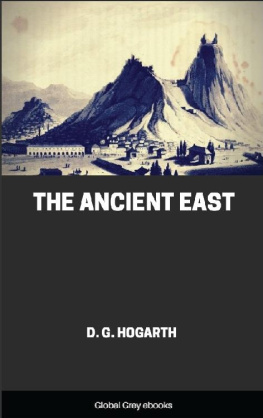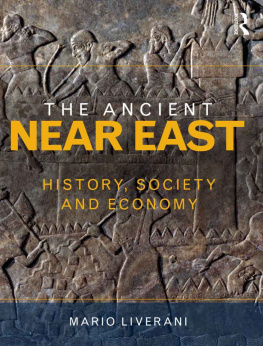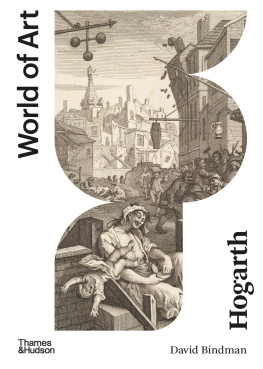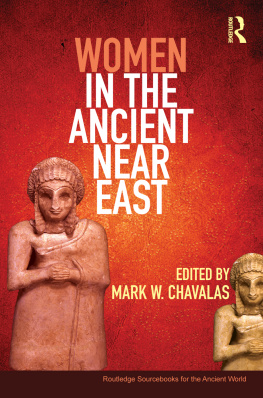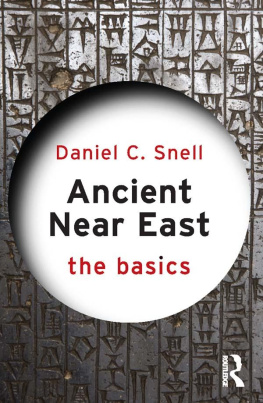D. G. Hogarth - The Ancient East
Here you can read online D. G. Hogarth - The Ancient East full text of the book (entire story) in english for free. Download pdf and epub, get meaning, cover and reviews about this ebook. year: 2018, publisher: Global Grey ebooks, genre: Art. Description of the work, (preface) as well as reviews are available. Best literature library LitArk.com created for fans of good reading and offers a wide selection of genres:
Romance novel
Science fiction
Adventure
Detective
Science
History
Home and family
Prose
Art
Politics
Computer
Non-fiction
Religion
Business
Children
Humor
Choose a favorite category and find really read worthwhile books. Enjoy immersion in the world of imagination, feel the emotions of the characters or learn something new for yourself, make an fascinating discovery.
- Book:The Ancient East
- Author:
- Publisher:Global Grey ebooks
- Genre:
- Year:2018
- Rating:5 / 5
- Favourites:Add to favourites
- Your mark:
- 100
- 1
- 2
- 3
- 4
- 5
The Ancient East: summary, description and annotation
We offer to read an annotation, description, summary or preface (depends on what the author of the book "The Ancient East" wrote himself). If you haven't found the necessary information about the book — write in the comments, we will try to find it.
The Ancient East — read online for free the complete book (whole text) full work
Below is the text of the book, divided by pages. System saving the place of the last page read, allows you to conveniently read the book "The Ancient East" online for free, without having to search again every time where you left off. Put a bookmark, and you can go to the page where you finished reading at any time.
Font size:
Interval:
Bookmark:
THE
ANCIENT EAST
BY
D. G. HOGARTH
1914
The Ancient East By D. G. Hogarth.
This edition was created and published by Global Grey
GlobalGrey 2018

globalgreyebooks.com
The title of this book needs a word of explanation, since each of its terms can legitimately be used to denote more than one conception both of time and place. "The East" is understood widely and vaguely nowadays to include all the continent and islands of Asia, some part of Africathe northern part where society and conditions of life are most like the Asiaticand some regions also of South-Eastern and Eastern Europe. Therefore it may appear arbitrary to restrict it in the present book to Western Asia. But the qualifying term in my title must be invoked in justification. It is the East not of to-day but of antiquity with which I have to deal, and, therefore, I plead that it is not unreasonable to understand by "The East" what in antiquity European historians understood by that term. To Herodotus and his contemporary Greeks Egypt, Arabia and India were the South; Thrace and Scythia were the North; and Hither Asia was the East: for they conceived nothing beyond except the fabled stream of Ocean. It can be pleaded also that my restriction, while not in itself arbitrary, does, in fact, obviate an otherwise inevitable obligation to fix arbitrary bounds to the East. For the term, as used in modern times, implies a geographical area characterized by society of a certain general type, and according to his opinion of this type, each person, who thinks or writes of the East, expands or contracts its geographical area.
It is more difficult to justify the restriction which will be imposed in the following chapters on the word Ancient. This term is used even more vaguely and variously than the other. If generally it connotes the converse of "Modern," in some connections and particularly in the study of history the Modern is not usually understood to begin where the Ancient ended but to stand only for the comparatively Recent. For example, in History, the ill-defined period called the Middle and Dark Ages makes a considerable hiatus before, in the process of retrospection, we get back to a civilization which (in Europe at least) we ordinarily regard as Ancient. Again, in History, we distinguish commonly two provinces within the undoubted area of the Ancient, the Prehistoric and the Historic, the first comprising all the time to which human memory, as communicated by surviving literature, ran not, or, at least, not consciously, consistently and credibly. At the same time it is not implied that we can have no knowledge at all of the Prehistoric province. It may even be better known to us than parts of the Historic, through sure deduction from archaeological evidence. But what we learn from archaeological records is annalistic not historic, since such records have not passed through the transforming crucible of a human intelligence which reasons on events as effects of causes. The boundary between Prehistoric and Historic, however, depends too much on the subjectivity of individual historians and is too apt to vary with the progress of research to be a fixed moment. Nor can it be the same for all civilizations. As regards Egypt, for example, we have a body of literary tradition which can reasonably be called Historic, relating to a time much earlier than is reached by respectable literary tradition of Elam and Babylonia, though their civilizations were probably older than the Egyptian.
For the Ancient East as here understood, we possess two bodies of historic literary tradition and two only, the Greek and the Hebrew; and as it happens, both (though each is independent of the other) lose consistency and credibility when they deal with history before 1000 B.C. Moreover, Prof. Myres has covered the prehistoric period in the East in his brilliant Dawn of History. Therefore, on all accounts, in treating of the historic period, I am absolved from looking back more than a thousand years before our era.
It is not so obvious where I may stop. The overthrow of Persia by Alexander, consummating a long stage in a secular contest, which it is my main business to describe, marks an epoch more sharply than any other single event in the history of the Ancient East. But there are grave objections to breaking off abruptly at that date. The reader can hardly close a book which ends then, with any other impression than that since the Greek has put the East under his feet, the history of the centuries, which have still to elapse before Rome shall take over Asia, will simply be Greek history writ largethe history of a Greater Greece which has expanded over the ancient East and caused it to lose its distinction from the ancient West. Yet this impression does not by any means coincide with historical truth. The Macedonian conquest of Hither Asia was a victory won by men of Greek civilization, but only to a very partial extent a victory of that civilization. The West did not assimilate the East except in very small measure then, and has not assimilated it in any very large measure to this day. For certain reasons, among which some geographical factsthe large proportion of steppe-desert and of the human type which such country breedsare perhaps the most powerful, the East is obstinately unreceptive of western influences, and more than once it has taken its captors captive. Therefore, while, for the sake of convenience and to avoid entanglement in the very ill-known maze of what is called "Hellenistic" history, I shall not attempt to follow the consecutive course of events after 330 B.C., I propose to add an epilogue which may prepare readers for what was destined to come out of Western Asia after the Christian era, and enable them to understand in particular the religious conquest of the West by the East. This has been a more momentous fact in the history of the world than any political conquest of the East by the West.
* * * * *
In the further hope of enabling readers to retain a clear idea of the evolution of the history, I have adopted the plan of looking out over the area which is here called the East, at certain intervals, rather than the alternative and more usual plan of considering events consecutively in each several part of that area. Thus, without repetition and overlapping, one may expect to convey a sense of the history of the whole East as the sum of the histories of particular parts. The occasions on which the surveys will be taken are purely arbitrary chronological points two centuries apart. The years 1000, 800, 600, 400 B.C. are not, any of them, distinguished by known events of the kind that is called epoch-making; nor have round numbers been chosen for any peculiar historic significance. They might just as well have been 1001, 801 and so forth, or any other dates divided by equal intervals. Least of all is any mysterious virtue to be attached to the millenary date with which I begin. But it is a convenient starting-point, not only for the reason already stated, that Greek literary memorythe only literary memory of antiquity worth anything for early historygoes back to about that date; but also because the year 1000 B.C. falls within a period of disturbance during which certain racial elements and groups, destined to exert predominant influence on subsequent history, were settling down into their historic homes.
A westward and southward movement of peoples, caused by some obscure pressure from the north-west and north-east, which had been disturbing eastern and central Asia Minor for more than a century and apparently had brought to an end the supremacy of the Cappadocian Hatti, was quieting down, leaving the western peninsula broken up into small principalities. Indirectly the same movement had brought about a like result in northern Syria. A still more important movement of Iranian peoples from the farther East had ended in the coalescence of two considerable social groups, each containing the germs of higher development, on the north-eastern and eastern fringes of the old Mesopotamian sphere of influence. These were the Medic and the Persian. A little earlier, a period of unrest in the Syrian and Arabian deserts, marked by intermittent intrusions of nomads into the western fringe-lands, had ended in the formation of new Semitic states in all parts of Syria from Shamal in the extreme north-west (perhaps even from Cilicia beyond Amanus) to Hamath, Damascus and Palestine. Finally there is this justification for not trying to push the history of the Asiatic East much behind 1000 B.C.that nothing like a sure chronological basis of it exists before that date. Precision in the dating of events in West Asia begins near the end of the tenth century with the Assyrian Eponym lists, that is, lists of annual chief officials; while for Babylonia there is no certain chronology till nearly two hundred years later. In Hebrew history sure chronological ground is not reached till the Assyrian records themselves begin to touch upon it during the reign of Ahab over Israel. For all the other social groups and states of Western Asia we have to depend on more or less loose and inferential synchronisms with Assyrian, Babylonian or Hebrew chronology, except for some rare events whose dates may be inferred from the alien histories of Egypt and Greece.
Next pageFont size:
Interval:
Bookmark:
Similar books «The Ancient East»
Look at similar books to The Ancient East. We have selected literature similar in name and meaning in the hope of providing readers with more options to find new, interesting, not yet read works.
Discussion, reviews of the book The Ancient East and just readers' own opinions. Leave your comments, write what you think about the work, its meaning or the main characters. Specify what exactly you liked and what you didn't like, and why you think so.

